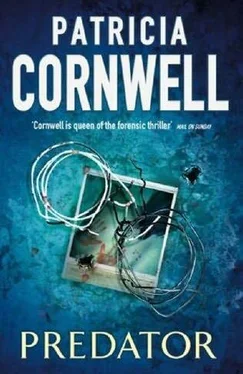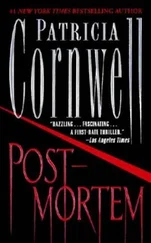Patricia Cornwell - Predator
Здесь есть возможность читать онлайн «Patricia Cornwell - Predator» весь текст электронной книги совершенно бесплатно (целиком полную версию без сокращений). В некоторых случаях можно слушать аудио, скачать через торрент в формате fb2 и присутствует краткое содержание. Жанр: Фантастика и фэнтези, на английском языке. Описание произведения, (предисловие) а так же отзывы посетителей доступны на портале библиотеки ЛибКат.
- Название:Predator
- Автор:
- Жанр:
- Год:неизвестен
- ISBN:нет данных
- Рейтинг книги:4 / 5. Голосов: 1
-
Избранное:Добавить в избранное
- Отзывы:
-
Ваша оценка:
- 80
- 1
- 2
- 3
- 4
- 5
Predator: краткое содержание, описание и аннотация
Предлагаем к чтению аннотацию, описание, краткое содержание или предисловие (зависит от того, что написал сам автор книги «Predator»). Если вы не нашли необходимую информацию о книге — напишите в комментариях, мы постараемся отыскать её.
Predator — читать онлайн бесплатно полную книгу (весь текст) целиком
Ниже представлен текст книги, разбитый по страницам. Система сохранения места последней прочитанной страницы, позволяет с удобством читать онлайн бесплатно книгу «Predator», без необходимости каждый раз заново искать на чём Вы остановились. Поставьте закладку, и сможете в любой момент перейти на страницу, на которой закончили чтение.
Интервал:
Закладка:
“But the absence of tool marks doesn’t mean it wasn’t sawn.”
“Correct.”
“Because he might have smoothed off the sawed-off barrel. If he did that, there’s no way for us to tell without recovering the weapon. A twelve-gauge. We know that much.”
They know that much from the Remington plastic four-petaled Power Piston wad that Scarpetta recovered from the inside of Daggie Simister’s devastated head. Beyond that fact, there are only a few more Scarpetta can state with certainty, such as the nature of the attack on Mrs. Simister, which the autopsy revealed to be different from what everyone presumed. Had she not been shot, there is a good chance she would have died anyway. Scarpetta is fairly certain Mrs. Simister was unconscious when her killer stuck the shotgun barrel into her mouth and pulled the trigger. It wasn’t an easy conclusion to determine.
Examinations of massive gaping injuries to the head can mask wounds that may have occurred before the final mutilating trauma. Sometimes forensic pathology requires plastic surgery, and in the morgue, Scarpetta did what she could to repair Mrs. Simister’s head, fitting pieces of bone and scalp back together, then shaving off the hair. What she found was a laceration on the back of the head and a skull fracture. The point of impact correlated with a subdural hematoma in an underlying part of her brain that had been left relatively intact after the shotgun blast.
If the stains on the carpet by the window in Mrs. Simister’s bedroom turn out to be her blood, then it’s likely this was where she was first attacked and would also explain the dirt and bluish fibers on the palms of her hands. She was struck hard from behind with a blunt object and went down. Then her assailant picked her up, all eighty-six pounds of her, and placed her on the bed.
“I mean, you could easily carry a sawed-off shotgun in a knapsack,” Joe is saying.
Scarpetta points the remote at the Hummer and unlocks the doors and replies wearily, “Not necessarily.”
Joe makes her tired. He annoys her more each day.
“Even if you sawed twelve or even eighteen inches off the barrel and six inches off the stock,” she remarks, “you’re still left with an eighteen-inch-long gun, at least. Assuming we’re talking about an autoloader.”
She thinks of the big black bag the citrus inspector was carrying.
“If we’re talking about a pump, you’re likely to have a longer gun than that,” she adds. “Neither scenario works with a knapsack, unless it’s a big one.”
“A tote bag, then.”
She thinks of the citrus inspector, of the long picker that he disassembled and packed inside his black bag. She’s seen citrus inspectors before and never noticed them using pickers. Usually, they look at what they can reach.
“I bet he had a tote bag,” Joe says.
“I’ve got no idea.” She’s about to snap at him.
Throughout the entire autopsy, he prattled and divined and pontificated until she could scarcely think. He found it necessary to announce everything he was doing, everything he was writing on the protocol attached to his clipboard. He felt it necessary to tell her the weight of every organ and deduce when Mrs. Simister ate last based on the partially digested meat and vegetables in her stomach. He made sure Scarpetta heard the crunching sound of calcium deposits when he opened partially occluded coronaries with the scalpel and announced that maybe atherosclerosis killed her.
Ha, ha.
And, well, Mrs. Simister didn’t have much to look forward to, anyway. She had a bad heart. Her lungs had adhesions, probably from old pneumonia, and her brain was somewhat atrophied, so she probably had Alzheimer’s.
If you have to be murdered, Joe said, you may as well be in bad health.
“I’m thinking he hit her in the back of the head with the butt of the gun,” now he is saying. “You know, like this.”
He rams an imaginary head with the imaginary stock of a shotgun.
“She wasn’t even five feet tall,” he continues his scenario. “So for him to slam her head with the butt of a gun that weighs maybe six or seven pounds, assuming it wasn’t sawed off, he would need to be reasonably strong and taller than her.”
“We can’t say that at all,” Scarpetta replies, driving out of the parking lot. “So much depends on his position in relation to her. So much depends on a lot of things. And we don’t know that she was struck with the gun. We don’t know that the killer was a he. Be careful, Joe.”
“Of what?”
“In your great enthusiasm to reconstruct exactly how and why she died, you run the risk of confusing the theoretical with the truth and turning fact into fiction. This isn’t a hell scene. This is a real human being who is really dead.”
“Nothing wrong with creativity,” he says, staring straight ahead, his thin mouth and long, pointed chin set the way they always are when he gets petulant.
“Creativity is good,” she replies. “It should suggest where to look and for what, but not necessarily choreograph the sort of reenactments you see in movies and on TV.”
32
The small guest house is tucked behind a Spanish-tile swimming pool amid fruit trees and flowering shrubs. It is not a normal place to see patients, probably not the best place to see them, but the setting is poetic and full of symbols. When it rains, Dr. Marilyn Self feels as creative as the warm, wet earth.
She tends to interpret the weather as a manifestation of what happens when patients walk through her door. Repressed emotions, some of them torrential, are released in the safety of her therapeutic environment. Weather volatilities happen all around her and are unique to her and intended for her. They are full of meaning and instruction.
Welcome to my storm. Now let’s talk about yours.
It’s a good line, and she uses it often in her practice and on her radio show and now her new television show. Human emotions are internal weather systems, she explains to her patients, to her multitude of listeners. Every storm front is caused by something. Nothing comes from nothing. Talking about the weather is neither idle nor mundane.
“I see the look on your face,” she says from her leather chair in her cozy living-room setting. “You got the look again when the rain stopped.”
“I keep telling you I don’t have a look.”
“It’s interesting that you get the look when the rain stops. Not when it starts or is even at its worst, but when it suddenly stops as it did just now,” she says.
“I don’t have a look.”
“Just now the rain stopped and you got that look on your face,” Dr. Self says again. “It’s the same look you get when our time is up.”
“No it isn’t.”
“I promise it is.”
“I don’t pay three hundred dollars a damn hour to talk about storms. I don’t have a look.”
“Pete, I’m telling you what I see.”
“I don’t have a look,” Pete Marino replies from the reclining chair across from hers. “That’s crap. Why would I care about a storm? I’ve seen storms all my life. I didn’t grow up in a desert.”
She studies his face. He is rather handsome in a very rough, masculine way. She probes the dusky gray eyes behind the wire-rimmed glasses. His balding head reminds her of a newborn’s bottom, pale and naked in the soft lamplight. His fleshy, rounded pate is a tender buttock waiting to be spanked.
“I think we’re having a trust issue,” she says.
He glowers at her from his chair.
“Why don’t you tell me why you care about rainstorms, about them ending, Pete. Because I believe you do. And you have the look even as we speak. I promise. You still have it,” she says to him.
He touches his face as if it is a mask, as if it is something that doesn’t belong to him.
Читать дальшеИнтервал:
Закладка:
Похожие книги на «Predator»
Представляем Вашему вниманию похожие книги на «Predator» списком для выбора. Мы отобрали схожую по названию и смыслу литературу в надежде предоставить читателям больше вариантов отыскать новые, интересные, ещё непрочитанные произведения.
Обсуждение, отзывы о книге «Predator» и просто собственные мнения читателей. Оставьте ваши комментарии, напишите, что Вы думаете о произведении, его смысле или главных героях. Укажите что конкретно понравилось, а что нет, и почему Вы так считаете.












